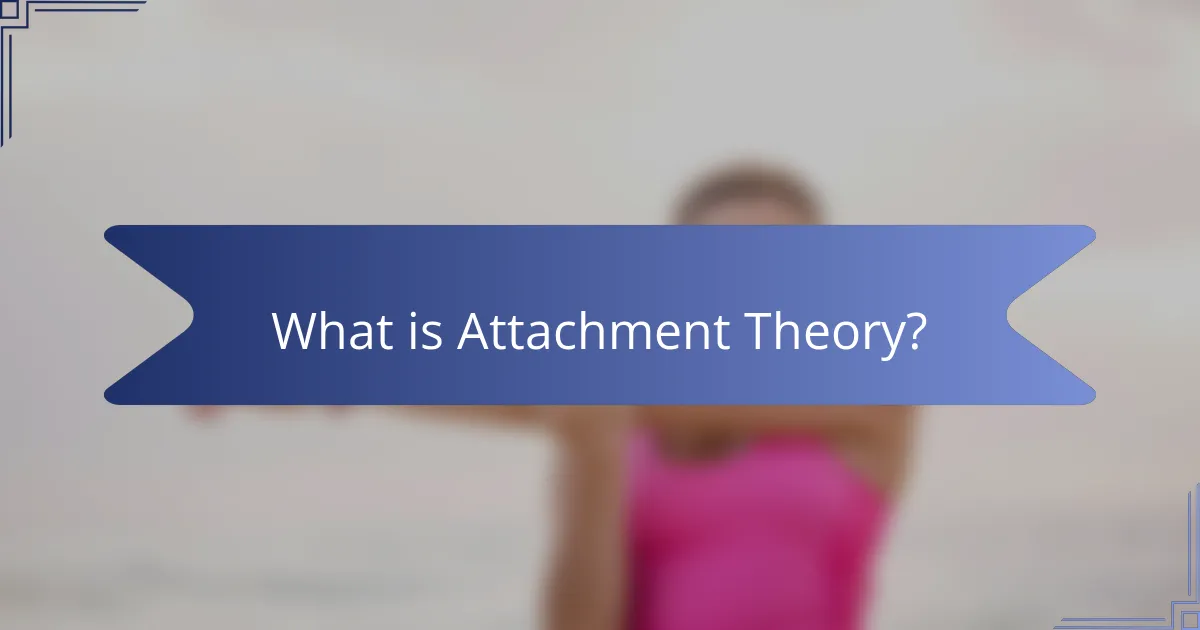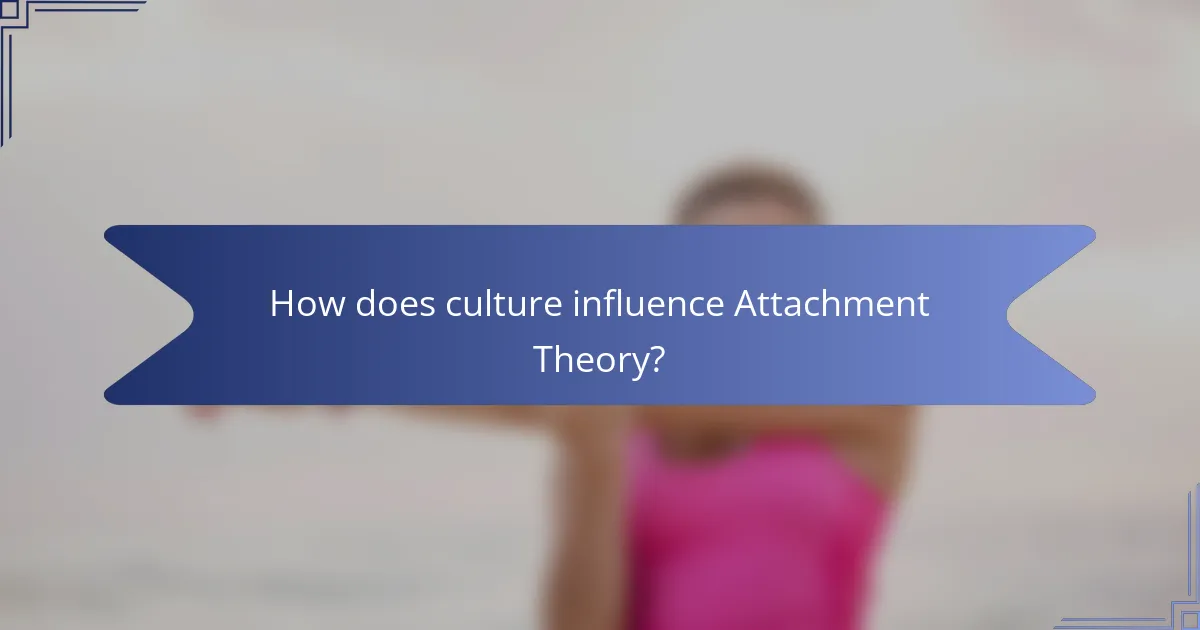Understanding Attachment Theory can enhance your relationships and promote personal growth. This framework examines how early emotional bonds influence adult interactions and communication styles. It explores secure, anxious, avoidant, and disorganized attachment styles and their effects on relationship satisfaction. Additionally, the role of culture and therapy in shaping these dynamics is discussed, providing insights for fostering healthier connections.

What is Attachment Theory?
Attachment theory explains how early relationships shape emotional bonds in adulthood. It emphasizes that secure attachments promote healthier relationships, while insecure attachments can lead to challenges in personal growth. Research shows that understanding one’s attachment style can enhance relationship dynamics and foster self-awareness. Secure attachment is linked to positive outcomes, such as increased empathy and resilience, while anxious or avoidant styles may hinder emotional intimacy.
How does Attachment Theory explain human relationships?
Attachment Theory explains that early relationships shape emotional bonds, influencing adult connections. Secure attachments foster trust and healthy communication, while insecure attachments can lead to anxiety and avoidance in relationships. This theory highlights the importance of nurturing positive early experiences for personal growth and relational stability. Understanding these dynamics can enhance emotional intelligence and improve relationship satisfaction.
What are the key components of Attachment Theory?
Attachment Theory comprises four key components: secure attachment, anxious attachment, avoidant attachment, and disorganized attachment. Secure attachment fosters healthy relationships, while anxious attachment leads to dependency. Avoidant attachment results in emotional distance, and disorganized attachment creates confusion in relationships. Each attachment style significantly influences personal growth and interpersonal dynamics. Understanding these components aids in improving relationship patterns and enhancing emotional well-being.

What are the universal effects of Attachment Theory on relationships?
Attachment Theory significantly influences relationships by shaping emotional bonds and communication styles. Secure attachment fosters trust and intimacy, while insecure attachment can lead to anxiety and avoidance. These dynamics affect conflict resolution and overall relationship satisfaction. Understanding these effects can promote personal growth and healthier interactions.
How does attachment style influence romantic relationships?
Attachment style significantly influences romantic relationships by shaping emotional responses and communication patterns. Secure attachment fosters trust and intimacy, while anxious or avoidant styles can lead to conflict and distance. Understanding these dynamics enhances personal growth and relationship satisfaction. For example, individuals with secure attachment are more likely to engage in healthy conflict resolution, promoting relationship stability. In contrast, those with anxious attachment may struggle with jealousy, impacting their partner’s sense of security. Recognizing one’s attachment style allows for targeted personal development and improved relational outcomes.
What role does attachment play in parental relationships?
Attachment significantly influences parental relationships by shaping emotional bonds and communication styles. Secure attachment fosters trust and emotional availability, enhancing parental responsiveness. In contrast, insecure attachment may lead to conflict and emotional distance. Research shows that attachment styles can predict parenting behaviors and child outcomes, emphasizing the importance of understanding these dynamics. Securely attached parents tend to raise emotionally resilient children, while those with insecure attachments may struggle with emotional regulation. This interplay highlights the critical role of attachment in personal growth and relationship quality.
How does Attachment Theory impact friendships?
Attachment Theory significantly influences friendships by shaping emotional responses and interpersonal dynamics. Individuals with secure attachment styles tend to form healthier, more stable friendships. They exhibit trust, effective communication, and empathy, fostering deeper connections. Conversely, those with anxious or avoidant attachment styles may struggle with intimacy or dependency, impacting their ability to maintain friendships. Understanding these attachment styles can enhance personal growth and improve relationship quality. This knowledge allows individuals to address their attachment-related behaviors, promoting healthier social interactions.

What are the unique attributes of Attachment Theory?
Attachment Theory uniquely emphasizes the emotional bonds formed in early relationships, shaping interpersonal dynamics throughout life. It identifies distinct attachment styles: secure, anxious, avoidant, and disorganized, each influencing behavior and relationships. Secure attachment fosters healthy relationships, while anxious attachment can lead to dependency. Avoidant attachment often results in emotional distance, and disorganized attachment may cause confusion in relationships. These styles significantly impact personal growth, influencing self-esteem and relationship satisfaction. Understanding these unique attributes can enhance emotional intelligence and interpersonal effectiveness.
How do different attachment styles manifest in adult relationships?
Different attachment styles significantly influence adult relationships, shaping emotional responses and behaviors. Secure attachment fosters healthy communication, while anxious attachment may lead to clinginess. Avoidant attachment often results in emotional distance, and disorganized attachment can create instability. Each style manifests uniquely in relationship dynamics, affecting personal growth and connection.
What are the psychological implications of secure vs. insecure attachment?
Secure attachment fosters healthy relationships and personal growth, while insecure attachment leads to emotional difficulties and relationship challenges. Securely attached individuals typically exhibit higher self-esteem and better social skills. In contrast, those with insecure attachment may struggle with trust and intimacy. Studies indicate that secure attachment correlates with resilience and adaptability, enhancing personal development. Insecure attachment, however, can result in anxiety and avoidance behaviors, affecting interpersonal dynamics. Understanding these implications is crucial for fostering healthier relationships and improving emotional well-being.

What are the rare attributes associated with Attachment Theory?
Rare attributes associated with Attachment Theory include the influence of early childhood experiences on adult relationships, variations in attachment styles across cultures, and the impact of trauma on attachment behavior. These attributes highlight how unique personal histories shape relational dynamics and individual growth.
How can early childhood experiences shape attachment styles?
Early childhood experiences significantly influence attachment styles, impacting future relationships and personal growth. Secure attachments formed in early life foster trust and emotional regulation, while insecure attachments can lead to difficulties in relationships. For example, children who experience consistent caregiving develop a strong sense of security, promoting healthier adult relationships. Conversely, those with inconsistent or neglectful care may struggle with intimacy and trust. Research indicates that about 60% of children develop secure attachment styles, while 40% exhibit insecure patterns. These early interactions shape emotional responses and coping mechanisms throughout life.
What uncommon attachment patterns exist?
Uncommon attachment patterns include anxious-avoidant, fearful-avoidant, and disorganized attachment. These patterns can lead to complex relationship dynamics and hinder personal growth. Anxious-avoidant individuals struggle with intimacy while desiring connection. Fearful-avoidant individuals experience anxiety about closeness and rejection. Disorganized attachment often results from trauma, leading to unpredictable behaviors in relationships. Understanding these patterns can facilitate better emotional awareness and healthier connections.

How does culture influence Attachment Theory?
Culture significantly shapes Attachment Theory by influencing emotional bonds and interpersonal dynamics. Cultural norms dictate how individuals express affection, manage conflict, and perceive relationships. For instance, collectivist cultures often prioritize group harmony, impacting attachment styles and relationship expectations. In contrast, individualistic cultures may emphasize independence, leading to different attachment behaviors. This cultural context can result in unique attributes in attachment styles, affecting personal growth and relationship satisfaction. Understanding these cultural influences is essential for applying Attachment Theory effectively across diverse populations.
What are the cultural variations in attachment styles?
Cultural variations in attachment styles influence relationship dynamics and personal growth. Different societies shape attachment behaviors through values and norms. For example, collectivist cultures often emphasize interdependence, leading to secure attachment styles, while individualistic cultures may promote independence, resulting in avoidant or anxious styles. Research indicates that these variations affect emotional expression and conflict resolution. Understanding these cultural differences can enhance interpersonal relationships and personal development.

What are the practical applications of Attachment Theory in personal growth?
Attachment Theory can significantly enhance personal growth by fostering self-awareness and improving interpersonal relationships. Understanding one’s attachment style helps individuals identify patterns in their relationships, leading to healthier connections.
For example, secure attachment promotes trust and effective communication, while anxious or avoidant styles may hinder emotional intimacy. By recognizing these traits, individuals can work on developing more secure attachments, enhancing their emotional resilience and relationship satisfaction.
Additionally, applying Attachment Theory in therapy can guide personal development strategies, such as building emotional regulation skills and enhancing empathy towards oneself and others. This approach not only supports individual healing but also contributes to more fulfilling relationships.
Overall, practical applications of Attachment Theory empower individuals to transform their relational dynamics and achieve personal growth.
How can understanding attachment styles improve relationships?
Understanding attachment styles can significantly enhance relationships by fostering better communication and empathy. Recognizing one’s own attachment style and that of a partner can lead to healthier interactions. For instance, individuals with secure attachment styles often create stable and supportive environments, while those with anxious or avoidant styles may struggle with intimacy and trust. By addressing these patterns, partners can work towards personal growth and mutual understanding, ultimately improving relationship satisfaction.
What strategies can individuals use to develop secure attachment?
To develop secure attachment, individuals can practice self-awareness, establish healthy boundaries, and foster open communication. Building trust through consistent actions enhances relationships. Engaging in therapy or support groups can also provide valuable insights and coping strategies. These approaches promote emotional regulation and resilience, key components of secure attachment.

What common mistakes do people make regarding Attachment Theory?
People often misinterpret Attachment Theory by oversimplifying it as merely about childhood experiences. They neglect its ongoing impact on adult relationships and personal growth. Another mistake is assuming that attachment styles are fixed; they can evolve with experiences. Additionally, many overlook the importance of secure attachment, focusing instead on anxious or avoidant styles. Misunderstanding the nuances of attachment can hinder effective communication and conflict resolution in relationships. Lastly, people frequently fail to recognize how their attachment style influences their emotional responses and relationship dynamics.
How can misconceptions about attachment styles affect relationships?
Misconceptions about attachment styles can significantly undermine relationships. They lead to misunderstandings, ineffective communication, and unmet emotional needs. For instance, believing that secure attachment is unattainable may prevent individuals from pursuing meaningful connections. Misinterpretations of behaviors linked to different attachment styles can result in conflict, as partners misread intentions and responses. Furthermore, these misconceptions can hinder personal growth, as individuals may not recognize the potential for change within their relational patterns. Understanding the nuances of attachment styles fosters healthier interactions and promotes emotional resilience.

What expert insights can enhance understanding of Attachment Theory?
Expert insights into Attachment Theory reveal its profound impact on relationships and personal growth. Understanding attachment styles—secure, anxious, avoidant—can enhance interpersonal dynamics. Research indicates that secure attachment fosters healthier relationships, while anxious or avoidant styles may lead to conflicts. Exploring these styles helps individuals recognize patterns and triggers, promoting emotional intelligence and self-awareness. Additionally, integrating therapeutic approaches, such as attachment-based therapy, can facilitate personal growth by addressing unresolved attachment issues. This holistic understanding empowers individuals to cultivate healthier connections and improve emotional resilience.
What are the best practices for applying Attachment Theory in daily life?
To effectively apply Attachment Theory in daily life, focus on understanding your attachment style and its impact on relationships. Recognize patterns in your interactions, practice open communication, and foster emotional awareness. Building secure attachments involves nurturing trust, setting healthy boundaries, and seeking support when needed. Additionally, reflecting on past experiences can enhance personal growth and relationship dynamics.